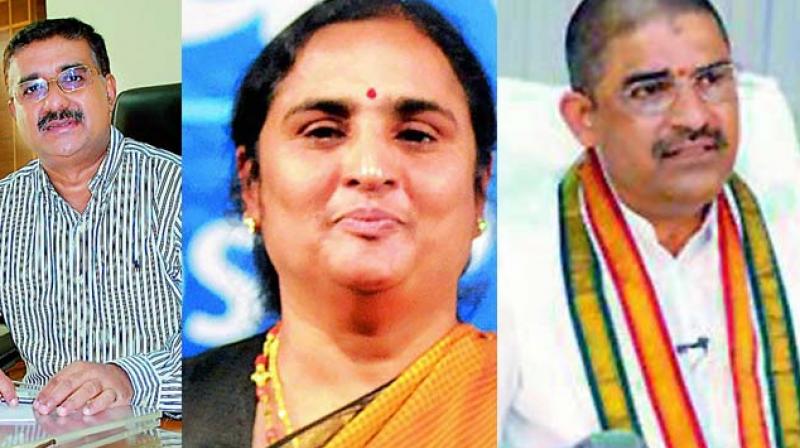ACB proceedings against officers quashed.

B.P. Acharya, Ratna Prabha and Subrahmanyam
By S A Ishaqui
Hyderabad, June 21: In a major relief to several IAS
officers, including L.V. Subrahmanyam, B.P. Acharya and K. Ratna Prabha,
the Hyderabad High Court on Tuesday quashed an order passed by the
Special ACB Court of the city to prosecute them for their involvement in
the Raheja Mindspace-APIIC joint venture project.
Justice B. Siva Sankar Rao was hearing petitions by Mr Subrahmanyam and Mr Acharya, managing directors of APIIC, and Ms Ratna Prabha, Mr Gopi Krishna IPS and Mr P.S. Murthy from the Information Technology and Communications department, and Neel Raheja of Raheja Corporation, urging the court to quash proceedings against them initiated by the Anti-Corruption Bureau. The ACB has charged these officials with “playing mischief” and “generating” an idea of giving alternative land at Nanakramguda by not paying cash to the JV company which resulted in decreasing APIIC’s share from 11 per cent to just 0.55 per cent. The case was lodged by T.Sriranga Rao, a city-based advocate.
He had moved a private complaint before the ACB court after which investigations were ordered.
Justice Siva Sankar Rao held that the trial judge has no power to review a previous dismissal or closed order.
ACB didn’t produce proof: HC
Justice Siva Sankar Rao held that the trial judge has no power to review a previous dismissal or closed order in view of the specific bar under Section 362 of the Cr PC and thereby the order of the special judge of December 28, 2015 in suo moto reopening the matter was unsustainable.
Maintaining that prior sanction to prosecute government servants is mandatory under Section 19 of the Prevention of Corrup-tion Act, and Section 196 of the CrPC, the judge held that in view of the rejection of the sanction by the Union of India, the proceedings against the petitioners are unsustainable and are liable to be quashed.
The judge held that there was nothing to attribute any criminal common intention, breach of trust or cheating against the petitioners and they have committed no criminal misconduct as public servants and there was no wilful acts on their part to cause any loss to the government or to benefit Raheja or its officials and nothing to show that they were involved in any agreement with Raheja Corporation to cheat the government.
The judge ruled that none of the offences with which the petitioners are charged have been proved against them either under sections 420 & 209 r/w. 34 or even under section 13 (1)(d) r/w 13(2) of the Prevention of Corruption Act.
The judge also held that the ACB had not produced evidence to show that the APIIC had abetted the petitioners to accept bribes.
Justice B. Siva Sankar Rao was hearing petitions by Mr Subrahmanyam and Mr Acharya, managing directors of APIIC, and Ms Ratna Prabha, Mr Gopi Krishna IPS and Mr P.S. Murthy from the Information Technology and Communications department, and Neel Raheja of Raheja Corporation, urging the court to quash proceedings against them initiated by the Anti-Corruption Bureau. The ACB has charged these officials with “playing mischief” and “generating” an idea of giving alternative land at Nanakramguda by not paying cash to the JV company which resulted in decreasing APIIC’s share from 11 per cent to just 0.55 per cent. The case was lodged by T.Sriranga Rao, a city-based advocate.
He had moved a private complaint before the ACB court after which investigations were ordered.
Justice Siva Sankar Rao held that the trial judge has no power to review a previous dismissal or closed order.
ACB didn’t produce proof: HC
Justice Siva Sankar Rao held that the trial judge has no power to review a previous dismissal or closed order in view of the specific bar under Section 362 of the Cr PC and thereby the order of the special judge of December 28, 2015 in suo moto reopening the matter was unsustainable.
Maintaining that prior sanction to prosecute government servants is mandatory under Section 19 of the Prevention of Corrup-tion Act, and Section 196 of the CrPC, the judge held that in view of the rejection of the sanction by the Union of India, the proceedings against the petitioners are unsustainable and are liable to be quashed.
The judge held that there was nothing to attribute any criminal common intention, breach of trust or cheating against the petitioners and they have committed no criminal misconduct as public servants and there was no wilful acts on their part to cause any loss to the government or to benefit Raheja or its officials and nothing to show that they were involved in any agreement with Raheja Corporation to cheat the government.
The judge ruled that none of the offences with which the petitioners are charged have been proved against them either under sections 420 & 209 r/w. 34 or even under section 13 (1)(d) r/w 13(2) of the Prevention of Corruption Act.
The judge also held that the ACB had not produced evidence to show that the APIIC had abetted the petitioners to accept bribes.
